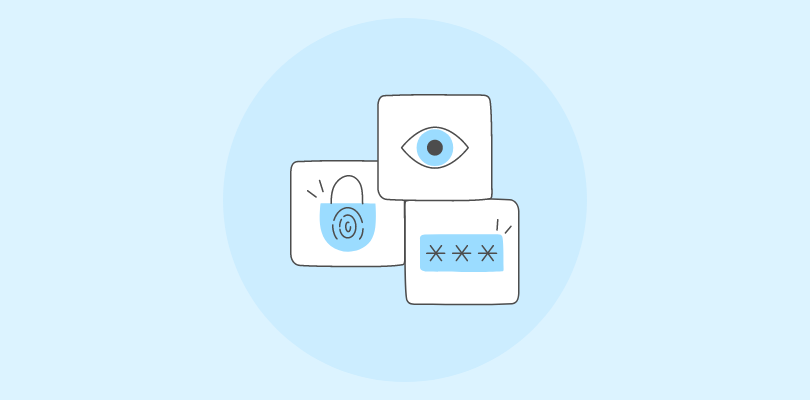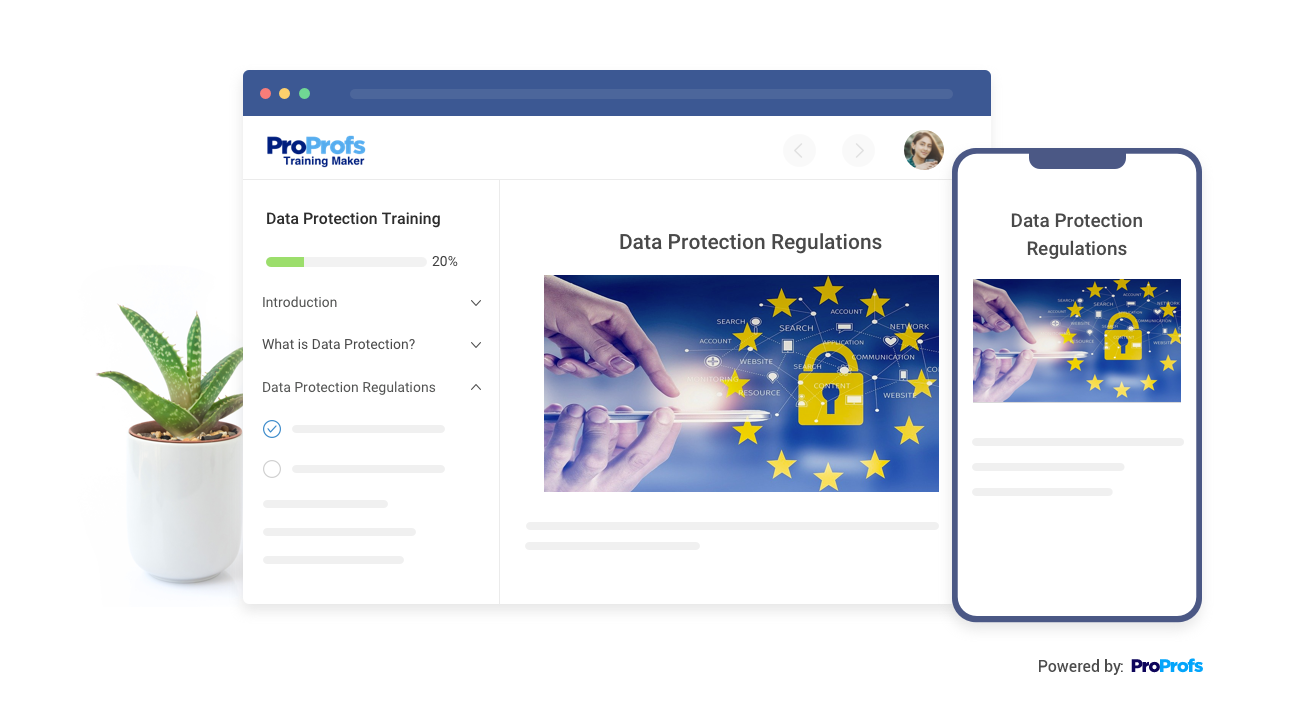
Cybersecurity threats are a significant concern for individuals and organizations today.
In recent years, these threats have become more sophisticated, with threat actors using AI and other techniques that are harder to detect. This necessitates cybersecurity training for employees.
Trained employees can serve as a human firewall and remain vigilant against data loss, financial loss, and operational disruption.
Considering the gravity of the issue, I’ve shared a few cybersecurity training courses in this blog post. They will help protect your employees, data, and the organization at large.
List of the Best Cybersecurity Training Courses
Here is a list of cybersecurity training programs for employees I have curated for you. These courses can help you fortify your digital assets effectively.
1. Cybersecurity Awareness Training
Global cybercrime costs are expected to grow by 15 percent per year over the next three years, reaching $10.5 trillion USD annually by 2025.
Now, doesn’t that speak volumes?
It underscores the urgent need for heightened cybersecurity measures.
To start with, I would recommend this cybersecurity training program. The course covers fundamental principles, common threats, and defense strategies, which offers a solid foundation for understanding the complexities of cybersecurity.
Designed for individuals at all levels, it’s completely beginner-friendly. Whether you’re an experienced professional or someone who regularly uses the internet on any electronic device, the course caters to your needs.
The curriculum is well-structured and covers crucial topics such as secure web browsing, email security, data and device security, mobile device and remote work security, and organizational security. This ensures your learners get a comprehensive knowledge of cybersecurity best practices.
2. Data Security Training
Given the rise in cybersecurity threats, particularly the surge in AI-driven attacks, I strongly recommend data security training.
As someone in the training industry, I often perform online research as a part of my job. One of the findings that came up during such exercises recently was that the USA was the primary target for cybercriminals and nation-state actors in Q1 2023. This accounts for 26% of the global total, with 8.1 million breached accounts.
This employee cybersecurity training program is crucial for those who want to safeguard their data against modern threats. It covers malware, phishing, and other AI-driven attacks. The course incorporates real-world scenarios, informative handouts, and rigorous assessments to ensure a better understanding of the most pressing security threats.
The course emphasizes the broader implications of data security, where employees learn how to maintain trust, protect their reputation, and comply with global regulations.
3. Data Protection Training

I’ve seen how data breaches can be really devastating. Recently, there has been a case where Norton Healthcare suffered a data breach impacting an estimated 2.5 million people. The firm, based in Kentucky, says that threat actors gained unauthorized access to personal information about millions of patients, as well as a considerable number of employees.
Seeing clients deal with compromised information, lost trust, and big fines made me believe that data protection is not just a technical challenge but a crucial part of ethical practice.
This cybersecurity awareness training for employees equips participants with the knowledge to handle the growing risk of data breaches. It covers essential principles of data security that examine common threats such as cyberattacks and insider leaks.
The course structure is carefully designed, with chapters breaking down key data protection measures: administrative controls (access policies), physical safeguards (secure infrastructure), and technical solutions (encryption).
Each chapter includes quizzes for interactive learning that’ll help reinforce your learners’ understanding of the concepts. Employees will gain the skills to implement strong data protection strategies and safeguard sensitive information effectively.
4. Security Awareness Training
Imagine this scenario:
The air crackled with tension as the CEO addressed his employees in a regretful voice. “The customer data leak…it’s a nightmare. Spam, phishing attacks, and angry emails flooding in. We’re facing lawsuits, brand trust is plummeting, and the legal fees are astronomical.”
The company later found the culprit – Sarah, an enthusiastic marketing intern at the company. Eager to impress, she’d emailed the customer list to a “freelancer” she found online to design a new campaign. But the freelancer was a wolf in sheep’s clothing, a cunning phisher who’d snagged the company’s most valuable asset – customer trust.
Topics like personal device security, phishing attacks, and social engineering equip employees with the essential knowledge to safeguard against cyber threats.
This cybersecurity training course ensures that they are well-informed and empowered to take proactive measures. When employees are trained, it fosters a cybersecurity culture and significantly reduces the organization’s vulnerability to online threats.
5. Mobile Device Security Training
Mobile devices, with their treasure trove of personal and professional information, are prime targets for cybercriminals. That’s why including mobile security training is essential.
T-Mobile, a major telecommunications company, experienced a data breach impacting approximately 37 million customers. The company discovered that a “bad actor” was extracting information through a single application.
This shows why it’s super important to make sure our mobile devices are secure.
The “Mobile Device Security Training Course” addresses the concerns about the security of mobile devices in our digitized society.
This cybersecurity training for employees equips participants with knowledge and skills to effectively identify and combat security threats.
With topics like common safety threats, best practices for mitigation, and guidelines for lost or stolen devices, the training ensures participants acquire the necessary skills to safeguard their mobile devices.
Maintain compliance by empowering employees to make wise choices, avoid costly data breaches, and mitigate potential legal risks. Invest in your future – secure your devices, secure your organization.
6. General Data Protection Regulation (GDPR)
Nearly 8 out of 10 US companies took steps to comply with the GDPR, and 27% of them spent over half a million dollars to become GDPR compliant. (source)
Now, you might wonder why this information matters to you.
Data breaches are common, so privacy and security of personal information are at stake. That’s where the GDPR comes into play.
I recently stumbled upon this GDPR course, and let me tell you, it seems like a game-changer. The course covers everything from the origins of the right to privacy to the nitty-gritty of GDPR. It dives into topics like the rights of data subjects, ways to manage data and reporting, breach notification, and more.
Companies like Salesforce, Microsoft, and IBM have invested heavily in GDPR compliance, which speaks volumes about safeguarding personal data.
If you’re in a position where data privacy matters (and in today’s world, who isn’t?), this course seems like a no-brainer.
Trust me, it’s a small investment that could pay off in the long run. After all, staying ahead in data protection is always a good idea!
7. Phishing Awareness Training
Let’s talk about why the next topic on cybersecurity awareness should focus on phishing.
Attackers use identity deception techniques, such as business email compromise (BEC) and brand impersonation, to exploit recipients’ trust and bypass email authentication standards.
Given the prevalence of phishing as a primary cause of security breaches, investing in a course like this makes a lot of sense. It’s a proactive step to arm your team with the knowledge and skills to spot and respond to such attacks effectively.
This cybersecurity course for employee training sheds light on what phishing is and delves into specific types, such as email phishing, senior management phishing, spear phishing, and even voice phishing. It covers all the bases, making it comprehensive and relevant.
This course caught my eye because it doesn’t just throw information at you; it engages learners with relatable scenarios and practical tips.
From what I’ve seen in the course outline, it covers the basics of phishing and ways to combat various types of such attacks. The end-of-chapter assessments ensure that the knowledge is not just acquired but retained.
8. HIPAA Compliance Training
HIPAA is a crucial legislation that ensures the privacy and security of medical information.
As of July 2022, there have been 38 cases under the HIPAA Right of Access initiative resulting in financial penalties.
The Office for Civil Rights (OCR) is sending a clear message by increasing enforcement, stating that violations of HIPAA Rules won’t be tolerated.
Violating HIPAA can lead to significant fines imposed by the OCR, even without an actual data breach. The financial impact depends on the level of negligence and, if a breach occurs, the number of records affected and the risk involved.
The ProProfs HIPAA Compliance Training Course meets and exceeds standard HIPAA guidelines and covers the provisions and responsibilities outlined in the legislation.
The self-paced microlearning design makes the course flexible for participants to learn at their convenience, fostering better engagement and understanding.
What makes this course a valuable addition is its practical approach. The inclusion of progress reports allows you to track individual and group performance in real time.
The best part is that this cybersecurity training program is adaptable to various roles, from doctors and nurses to insurance companies. Whether your team has existing knowledge about HIPAA or is new to the regulations, the course caters to their needs.
Led by an experienced Healthcare Compliance Professional, Sherrina Hansen, the course provides insights from someone deeply familiar with the intricacies of compliance.
Rise Above Threats With Cybersecurity Training Programs!
Cybercrime is a pressing problem, and unfortunately, it spares no one. Cybersecurity training is the best way to protect employees and enterprises from it.
The cybersecurity training courses that I have listed in this blog post will empower your employees to be the first line of defense against risks.
Data breaches and cyber threats are no longer just headlines; they’re real and present dangers that can cripple your business.
Investing in cybersecurity awareness training is a strategic move to safeguard your organization from financial loss, reputational damage, and operational disruptions.
However, if budget is something that bothers you, there are plenty of free cybersecurity training for employees available online.
Whether opting for paid or free courses, you should deliver the training and skipping it is not an option.
Cyber threats are ever-evolving, and investing in continuous education ensures your team stays equipped to safeguard against potential risks and bolster overall security measures.
Frequently Asked Questions
What is cybersecurity training for employees, and why is it essential?
Cybersecurity training for employees equips them to identify and respond to cyber threats, protect sensitive data, and mitigate costly breaches. Educated employees become the first line of defense against phishing, malware, and social engineering attacks. Cybersecurity training is highly important in a virtually connected world. It educates people on how to protect technological systems and sensitive data from malicious online elements. It makes employees combat-ready and builds a culture of compliance.
How do I choose the best cybersecurity training courses for employees?
To choose the best courses, consider your organization’s needs, employee roles, and budget. Prioritize interactive formats, relevant content, and reputable providers. Look for courses aligned with industry standards and offering post-training support.
Is cybersecurity training mandatory for all employees, or is it provided voluntarily?
Cybersecurity training mandates vary. Some industries have regulations requiring it for specific roles, while others rely on voluntary participation. Regardless of mandate, it’s a valuable investment for all employees.
Watch: What Is Compliance Training? Requirements & Benefits
How often should I train employees on cybersecurity?
It’s best to deliver cybersecurity awareness training for employees every 4-6 months. Researchers have found that most employees could pinpoint phishing emails four months after the training. But their memory started to decline after six months. This shows that there’s a need for employee training on cybersecurity 2-3 times a year.
Can cybersecurity training courses be customized to address specific organizational needs or industry requirements?
Absolutely! Many providers offer customizable training that addresses specific industry risks, data types, or software used by your organization. This ensures employees learn practical skills directly applicable to their daily work.
Watch: How to Configure Your Online Course Settings
What formats are available for cybersecurity training courses (e.g., in-person, online, workshops)?
Formats range from in-person workshops and online modules to interactive simulations and gamified experiences. Choose a blend that fits your budget, employee preferences, and learning styles. Consider microlearning modules for busy schedules.
Do you want a free Training Software?
We have the #1 Online Training Software for employee training & assessment





